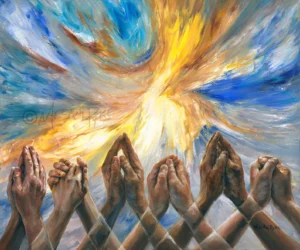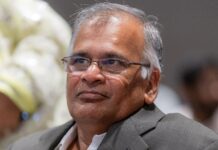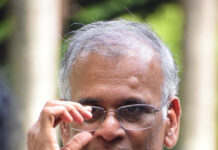
Dear J
I saw you for the first time at the Vishnupuram function. That day, I proudly told everyone at home that I had seen Jeyamohan. Later, when I came to listen to your speech in Tiruppur, I hesitated and couldn’t approach or speak to you. Next, when I saw the announcement about your speech in Namakkal, I decided that I had to go, and I made sure to attend.
My professor helped break hesitation, and meeting you in person, speaking with you for a few minutes, and taking a photo was a liberation of a kind (great joy). It was a profound joy that I experienced even before hearing your speech on ‘What is Liberation (Supreme Bliss).’ Whether I get to experience it again or not, it’s something unforgettable.
In your discourse, you summarized the essence of the six philosophies, their paths to liberation, six religions, mythologies, and practices. From that, I understood that the ultimate can be reached through various paths, and any path can lead to that goal. The discourse began with the idea that “liberation is freedom” and concluded with “existing is liberation,” presenting a new perspective. Thanks for such a wonderful discourse, Je.
My question is, if someone is following a particular path (philosophy/religion), should they also understand and gain clarity about the others? If so, where should one begin their study of that philosophy? Please forgive me if there are any mistakes in my questions.
Regards
Pavithra, Masinagudi
***
Dear Pavithra,
I should visit Masinagudi once, carrying the memories of Nithya.
In that talk, I emphasized the diversity of paths. So, the answer to this question also pertains to that diversity. If someone seeks liberation through devotion or worship, there is no need for them to be knowledgeable about other paths. Even if yoga is their path, it is not mandatory for them to understand the way of knowledge. However, if knowledge—meaning understanding and transcending the knowing—is their path, then they must, to some extent, have learned about opposing views and differing perspectives with an open mind.
If one’s path is through devotion, rituals, or yoga, they should never engage in debates with those who follow a different path. There is nothing more detrimental to spirituality than religious debates. If knowledge is their path, they may debate, but only after obtaining proper education and engaging with someone of equal learning, adhering to the correct methods of reasoning. Such debates should occur solely for the purpose of learning. After the debate, both participants should feel a sense of fulfillment. No debate should take place without the permission of the guru.
Learning is different from debating, and debating is different from public discourse. When we choose paths based on faith, we start debating within ourselves even as we learn. That very debate can shake our beliefs. To argue about devotion, worship, or rituals is, in itself, a sin. We can debate intellectually within ourselves, or with a close peer for clarity. Public debates should only be engaged once we are firmly established in our understanding. Such discussions should happen only when both we and our teacher are confident that no confusion from the debate can unsettle us.
There are many rules set for debates, and following them makes a debate meaningful. I used to think that debates without these methods were just a waste of time. But today, I realize that they also dull our thinking. If you argue with a stubborn person, you will slowly become stubborn yourself. No matter how sharp you are, if you debate with someone dull, you will eventually become dull as well.
In the past, debates were rare. We used to engage in discussions with people we were directly familiar with. But today, social media has amplified the scale of debates globally, making us argue with people we don’t even know. As a result, bitterness and ignorance are all that remain. Intellectual discussions cannot be conducted in such a manner. Debating spiritual matters is a grave mistake—it’s like spiritual suicide. Especially, we should act as if religious fanatics don’t even exist in our world.
Religious fanaticism is matched only by political stubbornness. No matter what is discussed, they will always land on the same point, unable to comprehend anything else. Similarly, there are those who harbor a deep attachment to caste or religion, cleverly concealing it while debating. When we engage with them, we end up doubting ourselves. Over time, we begin to suspect everyone who debates against us.
In today’s world, it is not always possible to win through arguments. All we can do is navigate through the many obstacles in our environment without getting torn apart.
Je
Original article:
ஆன்மீகப் பயணத்தில் மறுதரப்புகளை கற்றுக்கொள்ளவேண்டுமா?












